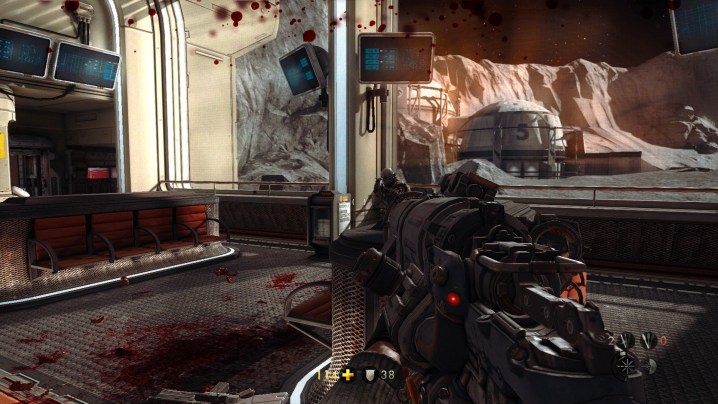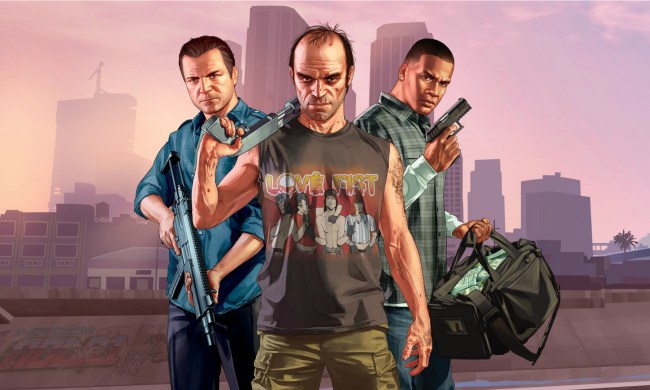They say those who don’t learn their history are doomed to repeat it, but what if they could change it, instead? Alternate history stories are incredibly popular in television and film, as well as in video games, where the most absurd concepts often lead to the best final products.
For decades, video games have been asking players what could have happened if one piece of history was changed – a life saved, or perhaps a life ended. The results have been tremendously creative and exhilarating stories that blend real historical places and events with fiction. They vary wildly in concept, but we think our list has something for just about everyone to enjoy. These are the best alternate history games.
Wolfenstein: The New Order

Wolfenstein 3D let you kill “Mecha-Hitler” in an intense shootout, so you could argue that Wolfenstein has always been an alternate history series. It really made the turn to the genre in the soft reboot Wolfenstein: The New Order, which imagined a future in which the Nazis developed an atomic bomb and won World War II, taking over nearly the entire world as a result. BJ Blazkowicz stands in their way, however, emerging from a decade-long coma to liberate the Allies and kill scores of fascist scum. The game was followed by an excellent sequel and spin-off titles, which expand on the lore and show what Adolf Hitler would have done if he hadn’t died in 1945.
Freedom Fighters

Once World War II ended, the United States found itself in the Cold War, as the Soviet Union had begun developing its own nuclear weapons and funding communist regime changes around the globe. It never came to direct war between the two superpowers, but Freedom Fighters imagines a scenario in which the Soviet Union invaded New York City. As a plumber-turned-resistance-leader, it’s up to you to gather rebels and take the fight to the occupiers. Freedom Fighters seems silly in premise, but developer IO Interactive knocked it out of the park with a criminally underappreciated gem.
Fallout

Fallout and its successors are set far in the future after a nuclear apocalypse, so why are they included in a list of alternate history games? Because prior to the games’ actual events, United States history looked very different. Culture exists in a sort of time capsule that never progressed beyond the early ‘50s, while technology has advanced far beyond what we have today. This divide creates the game’s humorous tone in the face of overwhelming dread, which has led to Fallout and its sequels being among the most celebrated games of all time.
BioShock Infinite

A prequel – kind of – to the 2007 original, BioShock Infinite uses time travel and parallel dimensions to create a new type of alternate history. Set in 1912, the game sees an America that has allowed a civilization to secede from the union and exist in the clouds, but the differences from our history do not stop there. Interdimensional rifts have allowed artists and criminals alike to learn about their future, lifting song compositions and chemical formulas to become their original creators. The game’s ambition and final moments may even be why we haven’t seen another game yet, as it seemingly addresses any possible follow-up.
Homefront

Homefront sees the United States in a very different place than it is today, with a military that is far from the most powerful in the world. This makes it a prime target for a North Korean invasion, and it’s up to you to spark a rebellion that will free the country from its clutches. The story was written by John Milius, who also scripted and directed the similar film Red Dawn. Just a short time later, that film would be remade with the Soviet Union replaced by North Koreans. A sequel to Homefront released several years after the original, but bugs limited its appeal.
Assassin’s Creed III

What if the Assassins and the Templars played key roles in the American Revolution? Though far from the best Assassin’s Creed game, Assassin’s Creed III’s premise was perhaps the most interesting, as it placed Templar enemies on both sides of the conflict. Protagonist Connor’s own father – a British immigrant – was a Templar, but so was American revolutionary Charles Lee. The result is a game that examines the morality of the Americans just as much as the British, and the role their presence had in the oppression of the native population.
XCOM: Enemy Unknown

XCOM: Enemy Unknown is primarily a science-fiction game, but it has its roots in The Bureau: XCOM Declassified, which is set several decades earlier as an alien invasion interrupts America’s post-war boom. Now, Earth has united in an attempt to drive back the invaders, who possess superior technology and overwhelming numbers that have left the planet on the brink of collapse. Its sequel XCOM 2 expands on these themes further, with the aliens now playing the role of occupiers in a sort of global prison.
Call of Duty: Black Ops

The Call of Duty game that Oliver Stone would salivate over, Call of Duty: Black Ops is a conspiracy theorist’s dream. Set before, during, and after the Vietnam War, with a short aside during World War II, the game questions the official report on the John F. Kennedy assassination, as well as the events of Bay of Pigs invasion. At the center of both events is Alex Mason, whose conversations with a certain Soviet war veteran make him question his sanity and temporarily believe he is another person entirely. It’s like a playable blockbuster summer flick, something many other Call of Duty games have tried but failed to achieve – including later Black Ops titles.
Resistance: Fall of Man

What if the conflicts of the 20th century never happened because of an alien attack? What would the world become? Insomniac Games asked these questions in the PlayStation 3 launch title Resistance: Fall of Man, which was different from the purely futuristic or fantastical shooters that had become prominent in the science-fiction genre at the time. Its blending of British architecture with alien technology and weapons was unique, and though its sequels couldn’t deliver on its ambitions, this remains one of Insomniac’s best titles.
Metro: 2033

We haven’t seen the planet destroyed by a nuclear apocalypse yet, but Metro: 2033 imagines that it would be a lot less “fun” than Fallout. Shortly after the 20th century began, all-out war between the leading superpowers devastated the planet and left survivors unable to live above ground. Their solution was to rebuild civilization in Moscow’s subway system, but the rise of mutants as well as neo-Stalinist and Nazi factions made this more challenging than expected. Add in the growing presence of a mysterious shadowy race, and you have one of the most original takes on nuclear destruction yet.
Vampyr

Dontnod Entertainment followed up Life is Strange with a very different type of game, albeit with a similar conversation system. Set just after World War I, Vampyr sees London in peril as disease spreads, but more importantly, monsters lurk around every corner. You play as a doctor who has recently become a vampire, and the future of the city largely rests in your hands. Do you decimate survivors to grow stronger and feed your bloodlust, or obey the Hippocratic oath? The choice is yours, with wildly different endings as a result of your actions.
Command & Conquer: Red Alert 2

What if World War II didn’t need to happen at all? Would a large-scale conflict between the United States and Soviet Union have been inevitable? The brilliant Command & Conquer: Red Alert 2 places the fate of the world in the hands of Albert Einstein, whose research allows both Adolf Hitler and Stalin to be eliminated. This doesn’t stop conflict from brewing, however, and additional scientific inventions make the threat of total global destruction all the more likely.
We Happy Few

War changes people, and in the case of We Happy Few’s version of 1960s England, it can lead to a world that is just as dark and depressing as it was when tanks rolled through the streets. Set in a pseudo-utopia that is actually under the control of nefarious forces through psycho-altering pills, We Happy Few puts you in the shoes of someone who isn’t falling for the lies. That makes you a prime target for persecution, and given how differently World War II may have gone if Germany were able to control Great Britain, We Happy Few seems scarily close to a potential reality.
Prey

Another game set in a future heavily affected by changes that occurred decades earlier, Prey is an alternate history game because the assassination attempt of Kennedy was a failure. As a result, the president would go on to live until 2031, ushering in an era of scientific development that led to much greater space exploration and experimentation. What does that mean for you as the player? You’ll be running away from shapeshifting alien creatures that seem poised to take over the planet, if they can make it there from your ship. You never know what changing one event can do for history!


